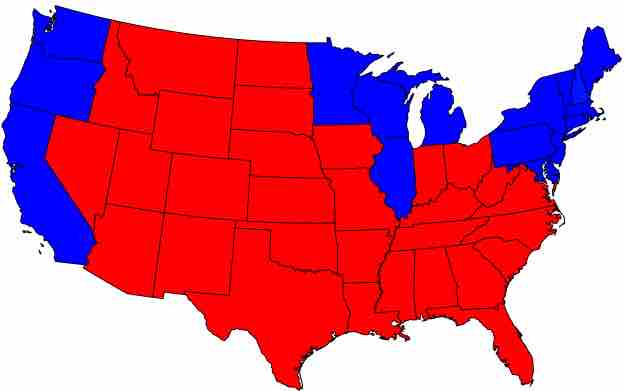Group Differences in Political Socialization
Political learning and socialization experiences can differ vastly for people depending on the groups with which they associate, such as those based on gender and racial and ethnic background. Certain groups are socialized to a more active role in politics, while others are marginalized.
Political Socialization and Socioeconomic Status
Socioeconomic status is determined by people's levels of education, income, and occupation. Wealthier and more highly educated people tend to have more opportunities to be socialized to political values. Consequently, they tend to have more defined political opinions, vote more often, participate more in political activities, and donate more money to causes than poorer or less educated people. Oftentimes, they have been raised by parents who are of the same socioeconomic status, who socialize them to believe in the importance of political participation.
Education has the strongest impact on participation, as it socializes people to the political system. Schools are important agents for political socialization, and as a result, educated people develop the skills that allow them to follow and understand events through the mass media. They are likely to form opinions about political issues and engage in discussions. Schools also prepare people to deal with the bureaucratic aspects of participation, such as registering to vote or organizing a petition drive.
Political Socialization and Race
People are attracted to groups with similar views. Generally, groups who have experienced historical discrimination or poverty are attracted to more liberal social doctrine. African Americans overwhelmingly identify with the Democratic party, and Latinos also identify with the Democratic party. Asian Americans are more likely to identify with the Republican party. Racial and ethnic groups, like other groups, socialize the members of the group towards different values in politics.
Black and white Americans are about equal in how much time and effort they devote to activities other than voting. However, they differ in the types of activities in which they have been socialized to participate in. Whites are more likely to contact public officials and join political organizations. Black citizens are active in election campaigns and social movements. Latinos tend to participate in other forms of political activity with less frequency than either white or black citizens. Cultural factors contribute to the lower levels of Asian American and Pacific Islander voting; for example, some are recent immigrants who still maintain strong ties to their ethnic culture. These groups have not experienced as much political socialization as other groups.
Political Socialization and Geographical Region
People are also socialized to accept different political values, ideologies, and parties based on the region of the country in which they grew up or currently live. For example, the southern United States is characterized as more conservative, against organized labor, and typically having less voter turnout. The conservative, agrarian midwestern states tend to vote with these Southern states, in alliance against the more liberal, urban voters on the east and west coasts.

Political Values by Geographic Region
This map of the different party strength in the 2004 Presidential Election (red states voted Republican and blue states voted Democrat) demonstrates the relationship between political socialization and geography.
This red-state blue-state divide can be more accurately explained by looking at urban and rural voting. People who live in large cities tend to vote Democratic, while rural Americans are more likely to vote Republican. County-by-county and district-by-district maps reveal that the "true" nature of geographical division, ideologically, is between urban areas/inner suburbs and suburbs/rural areas. For example, in the 2008 elections, even in "solidly blue" states, the majority of voters in most rural counties voted for Republican John McCain, with some exceptions. In "solidly red" states, a majority of voters in most urban counties voted for Democrat Barack Obama. An even more detailed precinct-by-precinct breakdown demonstrates that in many cases, large cities voted for Obama, but their suburbs were divided.
Political Socialization and Gender
There are significant differences in the way that males and females are socialized to politics. Historically, men have occupied a more central position in American political culture than women. This tradition was institutionalized at the time of the founding, when women did not receive the right to vote in the Constitution. While strides have been made over the past century to achieve political equality between the sexes, differences in sex-role socialization still exist. Traits associated with political leadership, such as being powerful and showing authority, are more often associated with males than females. Girls have fewer opportunities to observe women taking political action, especially as few females hold the highly visible positions, such as member of Congress and cabinet secretary, that are covered by mass media. This is starting to change as women such as Madeleine Albright and now Hillary Clinton attract media attention in their roles as secretary of state or as Nancy Pelosi did as Speaker of the House of Representatives . Despite these developments, women are still socialized to supporting political roles, such as volunteers in political campaigns, rather than leading roles, such as higher-level elected officials. The result is that fewer women than men seek careers in public office beyond the local level.
Hillary Rodham Clinton
Secretary of State Hillary Clinton is one of an increasing number of women who has achieved a highly visible political leadership role.